Contents
Market Overview
Macro Review
BOE intervention prevented further carnage. However, the QT to QE switch until October 14 may only stave off volatility temporarily as Prime Minister Truss is adamantly focused on unfunded tax cuts. The scrutiny is growing and the Tory government is slumping in the polls. Questions as to whether this was the UK gilt market’s “Lehman” moment continue. Some readers may disagree, but we can agree on market disorder with an effective margin call. After the largest one-day move wider in gilts, we saw the largest one-day rally. On Sunday, the UK’s Chancellor of Exchequer doubled down on unfunded tax cuts and went one step further. The admission of further tax cuts in January triggered GBP to sell-off to 1.0327 on Monday. Downing Street showed no signs of retreating but after a BOE press release on Monday and intervention on Wednesday, the gilt market showed signs of relaxing. The BOE also announced a £65bn QE program over 13-days, which comes out as £5bn in gilt purchases daily. This is stimulative as the BOE are not sterilizing to protect GBP, which explains the FX weakness. The immediate effect saw the 30-year gilt rally 138bps from the announcement into the end of the week. The government’s tax policy is being criticized more ardently by the IMF, Moody’s and even President Erdogan of Turkey. Such events seemed to overshadow Italian elections and even Russia’s scam-referenda in Ukraine. Nevertheless, tensions with the West are growing after Nord Stream 1 and 2 were sabotaged, just as Ukraine submitted its fast-track application to NATO. Volatility in U.S. Treasuries was of course the theme of the week as the 10-year note broke above 4.0%, even EMFX volatility reached a post-pandemic high. In keeping with our previous comments of verbal FX intervention in DM (Japan), China’s PBoC went just as far. The offshore renminbi broke above 7.26 to its weakest level since 2011, while the onshore FX weakened to levels not seen since 2008. China’s FX markets eased on the threat of the reintroduction of counter-cyclical factors associated with the daily fixing, but such volatility added to tensions in global markets. As such tensions persist, the next major test will come with Brazilian elections which are due to take place on Sunday.
EM Credit Update
Emerging market sovereign credit (cash bonds) ended the week down 3.2% with spreads 52bps wider. Outperformers over the week were Papua New Guinea, China and Suriname while Zambia, Pakistan and Sri Lanka underperformed. Focus on the week was again with core rates as the sell-off in GBP and subsequently, UK gilts.
EM credit ETFs held up well relative to cash indices. The EM Sovereign ETF (EMB) was down -4.2%, which underperformed US IG (LQD -1.7%), while US HY endured a late-in-week rally to edge up and only close -0.25% on the week. EM equities outperformed EM credit, with EEM down 2.3% just as DM recovered and SPX ended down just -1.1%. At the country-level across EEM, Peru (+3.4%), Saudi Arabia (+1.3%) and South Africa (+0.2%) outperformed, while the Philippines (-6.8%), Poland (-5.9%) and Turkey (-5.0%) lagged. The market wobble driven by GBP and UK gilts was extreme, but ultimately the volatility in U.S. Treasuries abated later in the week, with the iShares 20+ Year Treasury Index (TLT) ending the week only down -2.1%. The underperformance of CDX EM relative to European CDS was captured by iTraxx Main widening +4bps and Xover tightening 1bp, while EM was 8bps wider over the week. In U.S. markets, CDX IG may well have been unchanged, but CDX HY was 26bps wider this week and actually lagged EM.
The Week Ahead
ECB minutes, Brazilian elections and the U.S. NFP are the main fixtures next week. Meanwhile, Prime Minister Truss will be back in the spotlight as the Conservative Party Conference gets underway, just as the Labour Conference continues. Monetary policy decisions out of Australia and New Zealand may also move FX markets, given the G10 relevance. However, EM could see a slower week with Golden Week in China. EM interest rate decisions are limited to just Israel (2.0%), Romania (5.5%) and Uruguay (10.25%). Turkey’s inflation release is also due on Monday, which is set to rise from a few percentage points from 80.2% in August, although with Ankara and Istanbul inflation running far higher and there is little sign of reaching the peak in the near-term. Other EM inflation releases are due from Chile, Colombia, Indonesia, Mexico, Peru, Philippines, South Korea and Thailand.
Highlights from emerging markets discussed below include: Russia’s formal annexation of four Ukrainian regions after sham referenda, Pakistan gets new Finance Minister and Ghana and the IMF continue program negotiations.
Fixed Income
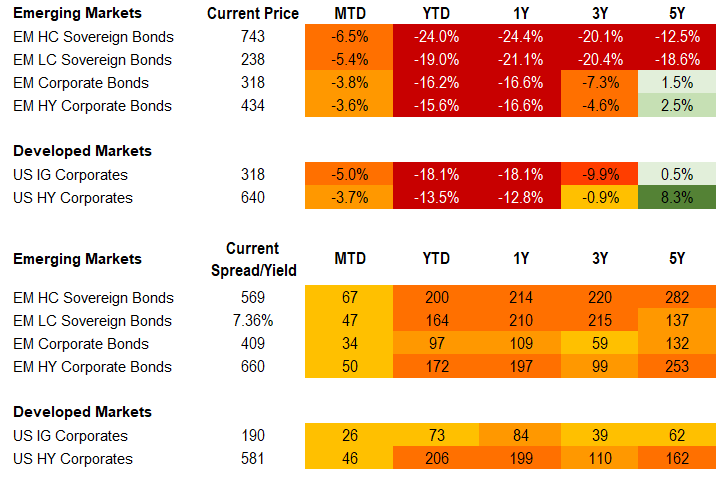
Equities
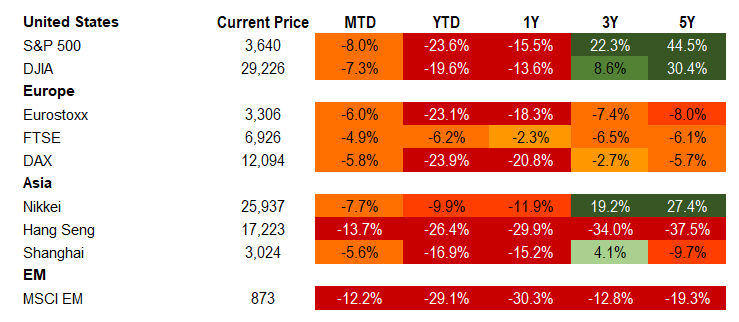
Commodities

Source for data tables: Bloomberg, JPMorgan, Gramercy. EM Fixed Income is represented by the following JPMorgan Indicies: EMBI Global, GBI-EM Global Diversified, CEMBI Broad Diversified and CEMBI Broad High Yield. DM Fixed Income is represented by the JPMorgan JULI Total Return Index and Domestic High Yield Index. Fixed Income, Equity and Commodity data is as of September 30, 2022 (mid-afternoon).
Emerging Markets Weekly Highlights
Russia’s formal annexation of four Ukrainian regions after sham referenda ushers in a new riskier phase in Ukraine war
Event: On Friday, President Putin signed documents proclaiming the annexation of four occupied Ukrainian regions (Donetsk, Luhansk, Zaporizhzhia, and Kherson) to the Russian Federation following Kremlin-organized referenda, which is unrecognized by most of the international community. It is expected that two houses of Russia’s parliament will approve the treaties by October 4th, ratifying them into law.
Gramercy commentary: We believe these developments mark the “end of the beginning” in the Ukrainian war and introduce a new, potentially more dangerous phase in which market risks emanating from the conflict might increase. Support for the war effort is strong on both sides, which carries significant escalation risks, especially if Ukrainian leadership decides to respond to Putin’s move by intensifying its counteroffensive against the now annexed territories before winter conditions settle in. In this context, we expect that Moscow will inevitably resort to more frequent and open references to its nuclear capabilities in order to “defend” the annexed territories, periodically sending shivers through global markets. We believe that the risk of nuclear weapons being used in/on Ukraine remains low but could grow higher if the chain of events unleashed by the annexations and Ukraine’s momentum on the battlefield puts President Putin “in a corner” over the coming months. As the situation in Ukraine becomes more challenging to manage, we expect the Kremlin will intensify its “proxy wars” against Europe, mostly via energy policy hoping to break the West’s resolve to maintain financial and military support for Ukraine. We believe this is unlikely to happen, which anchors our expectation for a protracted military conflict with significant escalation risks in early 2023 when the weather conditions improve.
Pakistan gets new Finance Minister amid pressured backdrop
Event: Amid ongoing economic volatility, former Finance Minister Miftah Ismail has been replaced by Ishaq Dar, who has held the post three times previously. Meanwhile, there have been calls for bilateral debt relief and additional support from the IMF given increasingly strained economic conditions.
Gramercy commentary: We see the change at the finance ministry as mixed. On one hand, the shake-up, in the context of an increasingly uncertain economic and political backdrop, likely further complicates crisis management at the margin. On the other hand, Dar is well known domestically and externally with IMF negotiation and program execution experience. His historical preference and emphasis on currency stability has been highlighted in the media and has likely, in part, contributed to the roughly 5% reversal in the rupee this week. However, ongoing balance of payment pressures amid elevated import costs and economic devastation from flooding will likely continue to pressure FX reserves, requiring debt relief. While there may be room for some flood-related support, we see political dynamics complicating broader near-term expansion of multilateral financial assistance.
Ghana and the IMF continue program negotiations in Accra
Event: The authorities and the IMF continued talks on a macroeconomic program and corresponding facility this week. Meetings are set to continue next week with content to guide the 2023 budget due by mid-November. The government has indicated plans to fast track IMF negotiations following last week’s comments regarding their intent to restructure local debt.
Gramercy commentary: We see the acceleration of an IMF deal and restructuring plans as constructive, particularly if it’s well-coordinated domestically and externally. While the comments this week are supportive of this, there are still likely further efforts needed to consolidate relevant parties and plan specifics. We think an IMF staff-level agreement on an Extended Credit Facility and/or a Resilience and Sustainability Trust program is possible before year-end, even if not announced imminently after this visit.
Emerging Markets Technicals
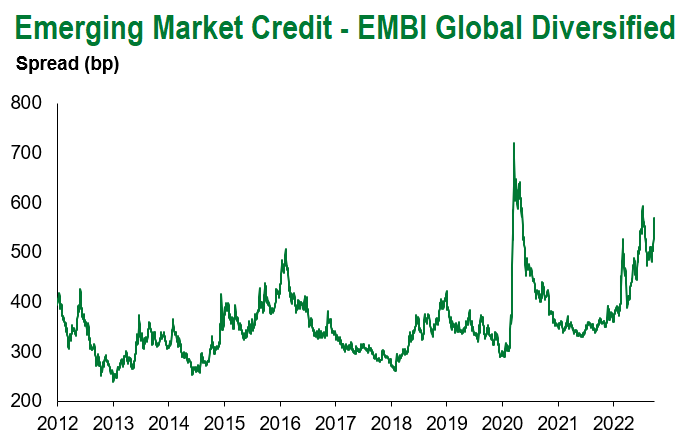
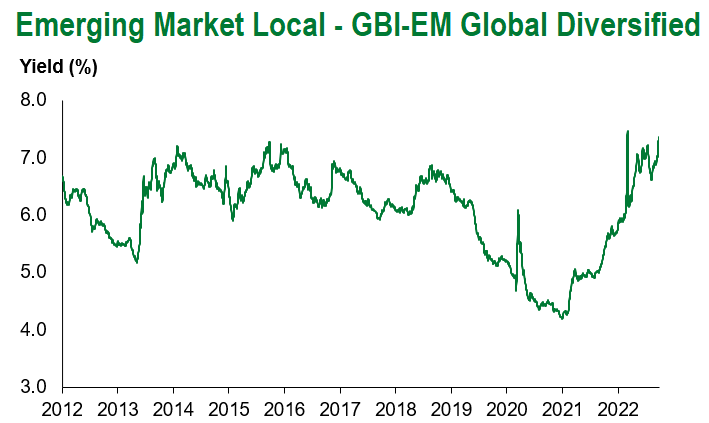
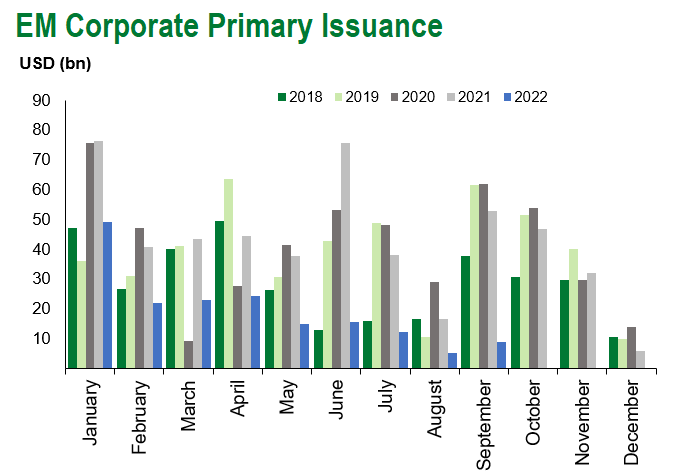
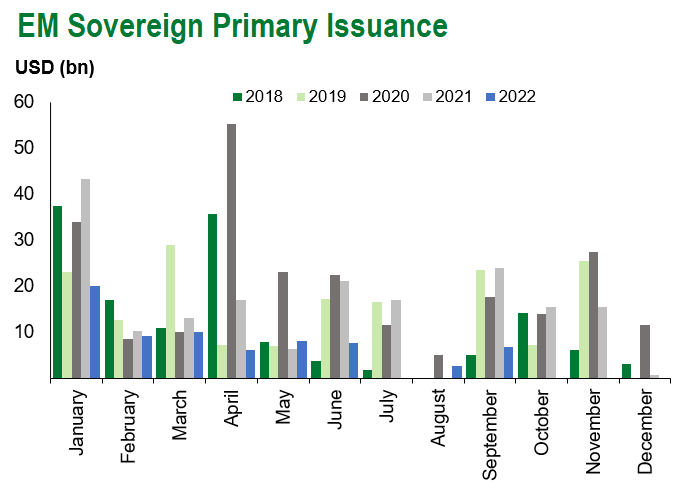
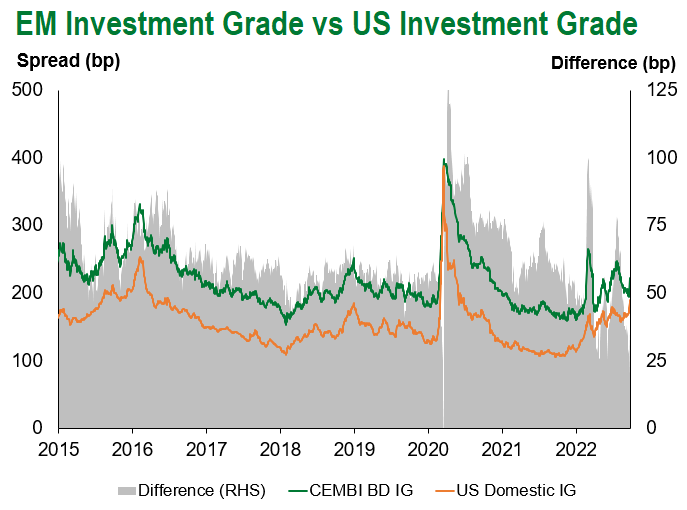
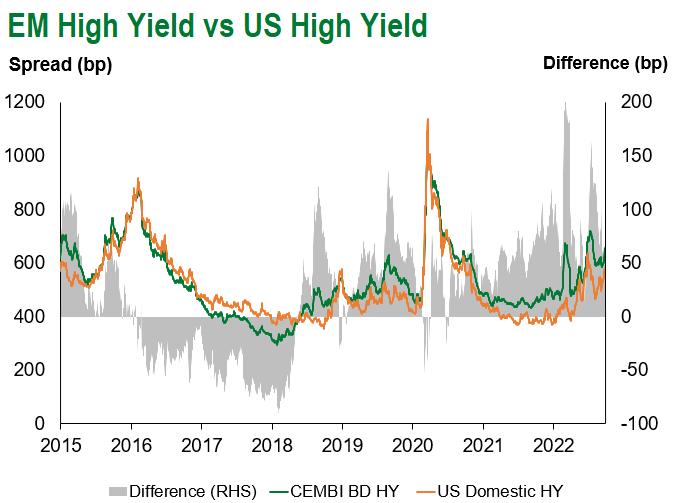
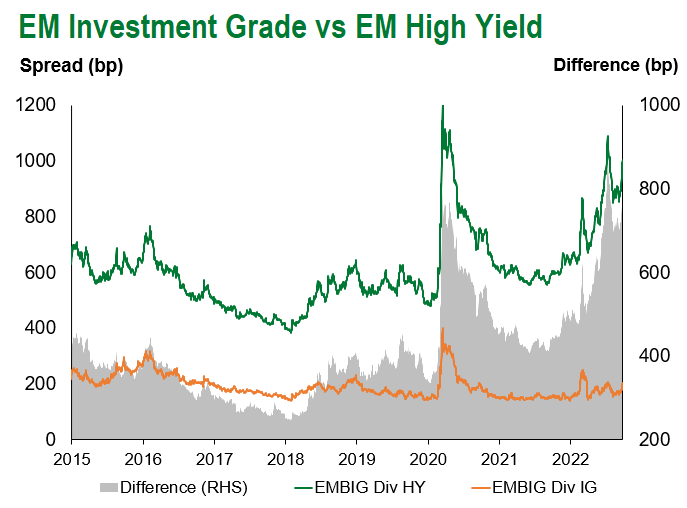
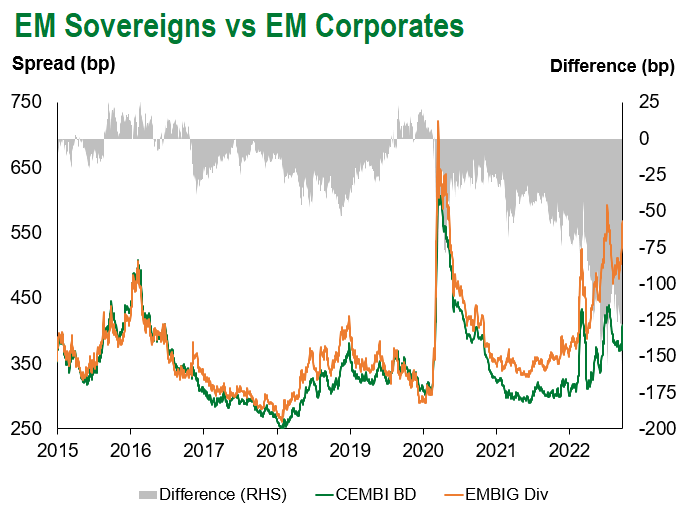
Emerging Markets Flows
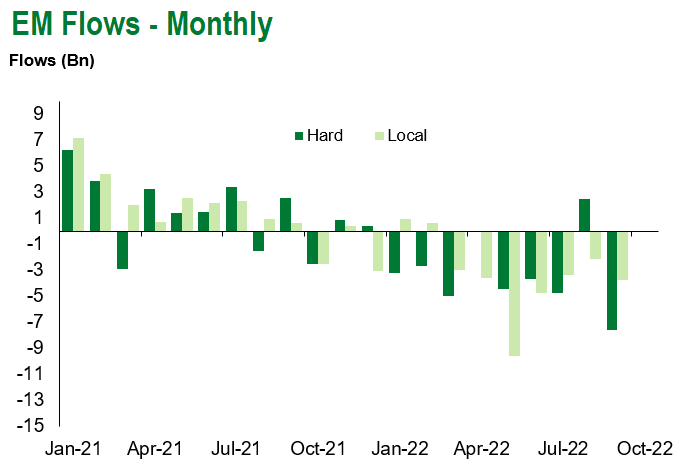
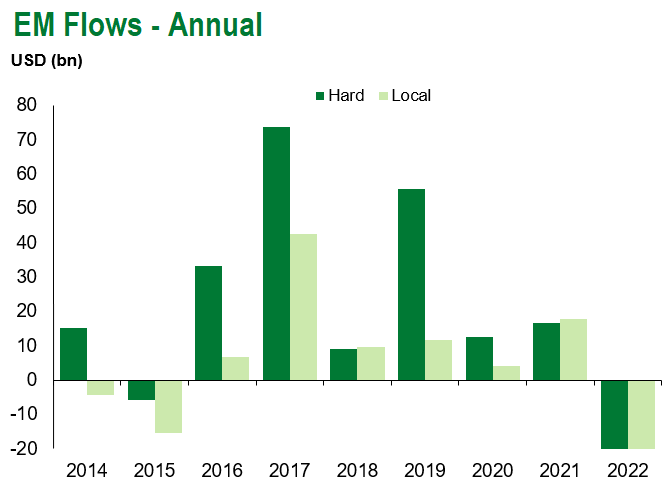
Source for graphs: Bloomberg, JPMorgan, Gramercy. As of September 30, 2022.
COVID Resources:
Johns Hopkins COVID-19 Case Tracker
For questions, please contact:
Kathryn Exum, CFA ESG, Director, Co-Head of Sovereign Research, [email protected]
Petar Atanasov, Director, Co-Head of Sovereign Research, [email protected]
James Barry, Director, Deputy Portfolio Manager, [email protected]
This document is for informational purposes only. The information presented is not intended to be relied upon as a forecast, research or investment advice, and is not a recommendation, offer or solicitation to buy or sell any securities or to adopt any investment strategy. Gramercy may have current investment positions in the securities or sovereigns mentioned above. The information and opinions contained in this paper are as of the date of initial publication, derived from proprietary and nonproprietary sources deemed by Gramercy to be reliable, are not necessarily all-inclusive and are not guaranteed as to accuracy. This paper may contain “forward-looking” information that is not purely historical in nature. Such information may include, among other things, projections and forecasts. There is no guarantee that any forecasts made will come to pass. Reliance upon information in this paper is at the sole discretion of the reader. You should not rely on this presentation as the basis upon which to make an investment decision. Investment involves risk. There can be no assurance that investment objectives will be achieved. Investors must be prepared to bear the risk of a total loss of their investment. These risks are often heightened for investments in emerging/developing markets or smaller capital markets. International investing involves risks, including risks related to foreign currency, limited liquidity, less government regulation, and the possibility of substantial volatility due to adverse political, economic or other developments. References to any indices are for informational and general comparative purposes only. The performance data of various indices mentioned in this update are updated and released on a periodic basis before finalization. The performance data of various indices presented herein was current as of the date of the presentation. Please refer to data returns of the separate indices if you desire additional or updated information. Indices are unmanaged, and their performance results do not reflect the impact of fees, expenses, or taxes that may be incurred through an investment with Gramercy. Returns for indices assume dividend reinvestment. An investment cannot be made directly in an index. Accordingly, comparing results shown to those of such indices may be of limited use. The information provided herein is neither tax nor legal advice. Investors should speak to their tax professional for specific information regarding their tax situation.
